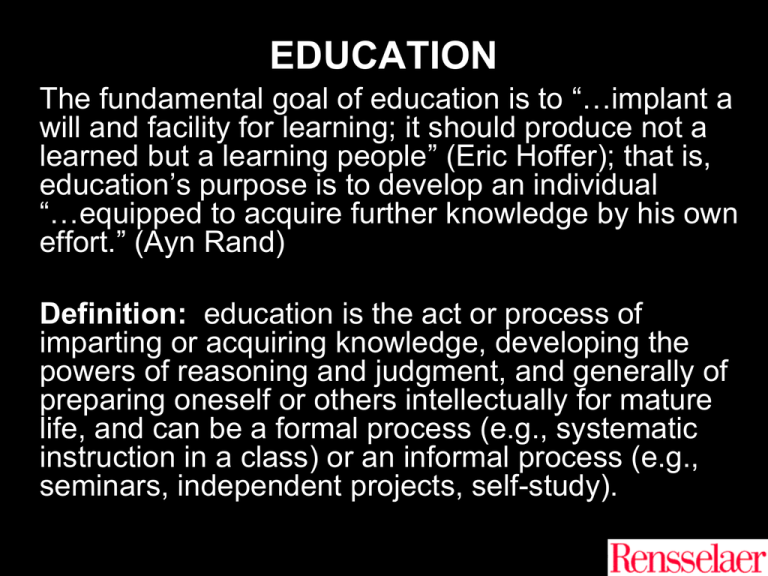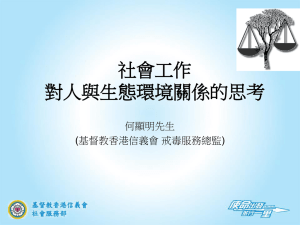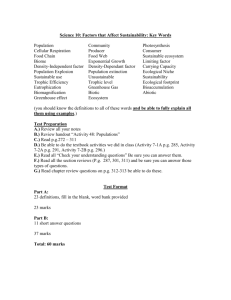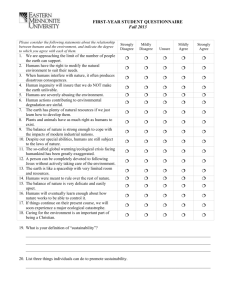Education
advertisement

EDUCATION The fundamental goal of education is to “…implant a will and facility for learning; it should produce not a learned but a learning people” (Eric Hoffer); that is, education’s purpose is to develop an individual “…equipped to acquire further knowledge by his own effort.” (Ayn Rand) Definition: education is the act or process of imparting or acquiring knowledge, developing the powers of reasoning and judgment, and generally of preparing oneself or others intellectually for mature life, and can be a formal process (e.g., systematic instruction in a class) or an informal process (e.g., seminars, independent projects, self-study). Education: In the classroom Programs focused specifically on sustainability • • • • • • Environmental Engineering Electrical Power Engineering Ecological Economics Values and Policy Environmental Science Design, innovation, and society Other programs, which may indirectly contribute to a student’s knowledge on sustainability, include: • Undergraduate Research Program (URP) • Study Abroad Programs • Vasudha - Living and Learning Community Education: In the classroom (cont.) Rensselaer has multiple courses across disciplines that focus on sustainability: – Environment and Society – Environmental Economics – Science of the Environment – Materials and Enclosures – Environmental and Ecological Systems – Environmental Impact Analysis – Introduction to Environmental Studies – Sustainability and Design Graduate programs related to sustainability • ENGINEERING – The Engineering, Science, and Entrepreneurship of Fuel Cells (IGERT) – Environmental Engineering • ARCHITECTURE – Built Ecologies – Lighting • HUMANITIES, ARTS, AND SOCIAL SCIENCES – Ecological Economics • SCIENCE – Geology – Hydrogeology Education: Out of the classroom Sustainability projects and activities that educate students • National Science Foundation GK-12 Program: Discovery-Based Activities in Energy and the Environment • Solar Decathlon (Several students and faculty worked together to submit a proposal to compete in the U.S. Department of Energy’s Solar Decathlon, in which 20 colleges are chosen to compete to design and build the best energy-efficient home. In 2008, Rensselaer came in a close 21st, and therefore could not participate in the actual competition.) • Wind Turbine Student Organizations • Ecologic • Engineers for a Sustainable World • The Society for Environmental Professionals • The Student Sustainability Task Force (SSTF) • Terra Cafe • Ecohall Challenge • Green Greeks Rensselaer Incubator Program • “Ecovative Design”, “All for Local” and “Arclay, LLC” Future sustainability activities/plans Faculty are working to develop majors in sustainability – STS is pursuing a sustainability studies major – Engineering is investigating a sustainability studies option through one (or more) of its existing major degree programs – There are other existing majors (e.g., Biology, with a concentration in ecology; or the school-wide Environmental Science major as administered by E&ES) that are appropriate for students with a strong interest in sustainability We expect that some of the common elements within any sustainability studies major will be a four (4) course core that includes courses in – – – – Ecological Economics Biology (with a focus on ecology) Earth Sciences Environmental Sociology as well as common experiences including an introductory environmental seminar and research experience within the major Faculty are working to develop a range of sustainability-related minors in multiple academic departments/schools: – “Traditional” four (4) course minors – “Robust” minors (5-6 courses, or more)









